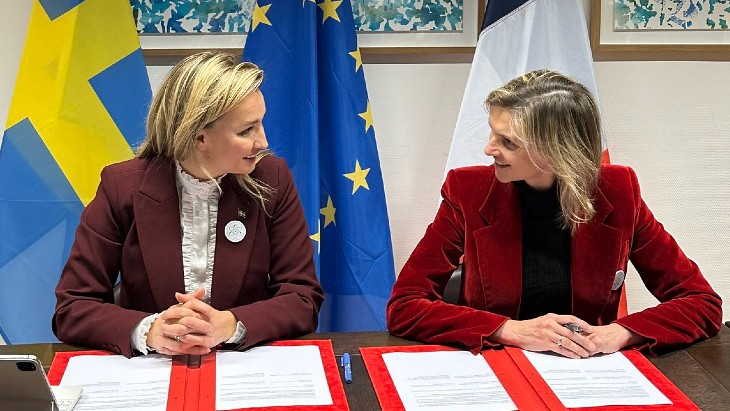
The declaration was signed in Brussels on 19 December by Sweden's Deputy Prime Minister and Energy & Industry Minister Ebba Busch (pictured above, left) and France's Energy Minister Agnés Pannier-Runacher (above right).
The declaration calls for the two countries, among other things, to exchange experiences regarding financing models for the expansion of new nuclear power and encourage increased cooperation between the Swedish and French nuclear power industries. In addition, the countries will exchange technical experience in reactor maintenance, as well as lifetime and power upgrades of existing nuclear power reactors.
It says France and Sweden will "promote a regulatory, industrial and financial framework favourable to the realisation of nuclear installation projects with a high level of safety and ensuring institutional support for nuclear energy in compliance with the principle of technological neutrality and with the objective of strengthening Europe's sovereignty and energy security".
In the field of the nuclear fuel cycle, the countries will seek to reinforce the security of supply of nuclear materials and fuels "by endeavouring to promote cooperation between their industries to diversify supply and reduce EU dependence on Russian nuclear materials and services". They will also aim to strengthen bilateral cooperation in the field of used fuel management, radioactive waste management and the associated logistics operations.
The countries noted the close relations that exist between their nuclear regulators, the French Nuclear Safety Authority and the Institute for Radiation Protection and Nuclear Safety and the Swedish Radiation Safety Authority.
"Increased international cooperation on nuclear power is central to enabling a massive expansion of nuclear power in Sweden by 2045," Busch said. "France, like Sweden, has great experience in the nuclear power field and I look forward to strengthening the Swedish-French cooperation."
Last month, the Swedish government unveiled a roadmap which envisages the construction of new nuclear generating capacity equivalent to at least two large-scale reactors by 2035, with up to ten new large-scale reactors coming online by 2045.